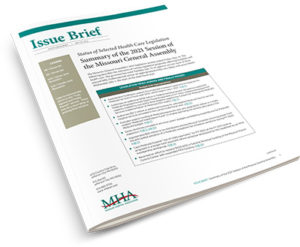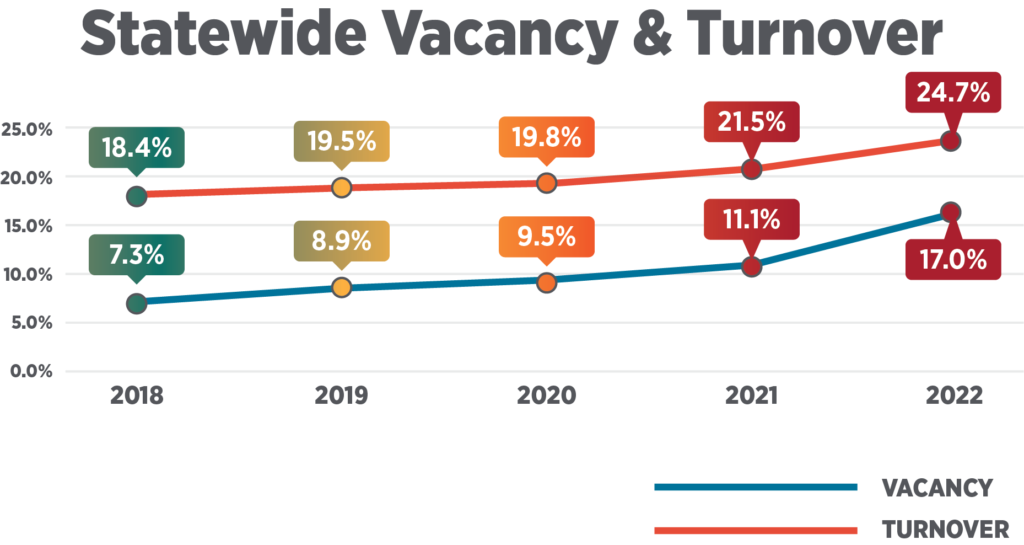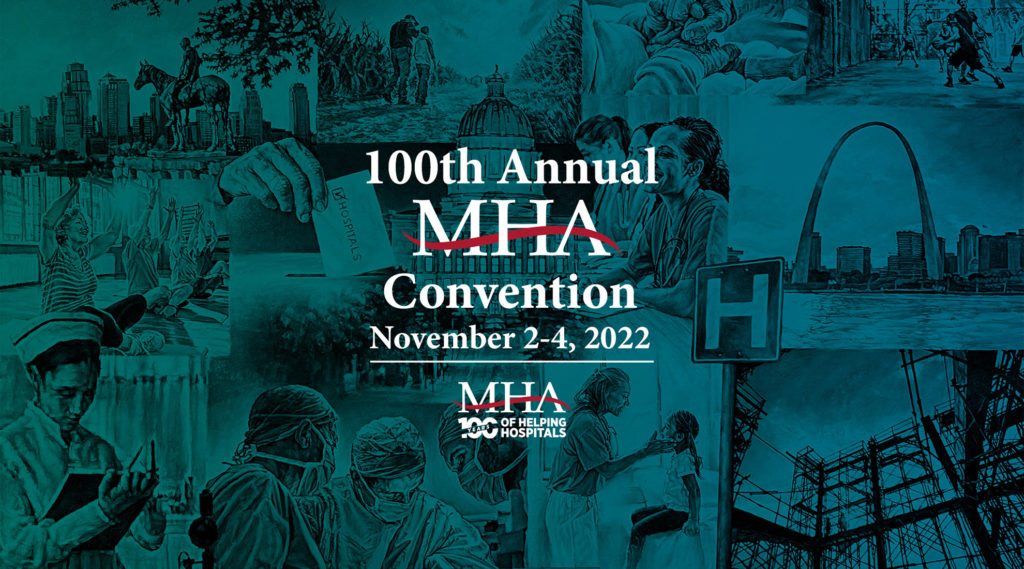
Summary Of The 2022 State Legislative Session
MHA Contact: Jane Drummond
The Missouri General Assembly concluded its session May 13. It passed a total of 66 bills, including 19 appropriations bills. Twenty-one bills passed on the final day. MHA summarized the outcomes of many state legislative proposals affecting hospital and health care.
The legislature fully funded Medicaid expansion for state fiscal year 2023 and added $3 million to the Nurse Education Incentive program. Senate Bill 672 expanded the Fast Track workforce grant program. Approximately 50% of Fast Track funds support students in the allied health professions.
MHA supported legislation improving the Time Critical Diagnosis program for treatment of stroke, STEMI and trauma patients. SB 710 establishes the TCD Advisory Committee and provides for enhanced coordination between hospitals, emergency medical services and the state. It also streamlines the designation process and data collection provisions.
MHA staff successfully advocated for changes to the civil commitment process. Currently, affidavits submitted to the court supporting the need for an involuntary detention require notarization. Oftentimes, the transfer of behavioral health patients occurs in the middle of the night. The notarization requirement impeded the transfer of patients to an appropriate level of care. SB 775 removes the notarization requirement and allows supporting documents to be signed under penalty of perjury.
The No Patient Left Alone Act/Compassionate Care Visitation Act impose certain visitation requirements on hospitals, long-term care and hospice facilities. At least two visitors must be allowed for at least six hours per day. Parents and guardians must have access to their minor child receiving care in the facility. Hospitals may restrict visitors to certain areas of the facility and deny visitation in certain circumstances, including when the visitor shows measurable signs of infection or presents a danger to patient health and welfare. During declared emergencies associated with infectious disease, new visitation rules apply. The bills establish an essential caregiver program by which patients may designate up to two caregivers who are allowed in-person contact for at least four hours per day. When appropriate, essential caregivers should have 24-hour access to the patient.
MHA staff successfully opposed prohibitions on vaccine mandates that would have placed hospitals at odds with Centers for Medicare & Medicaid Services requirements. House Bill 1606 prohibits a political subdivision from requiring COVID-19 vaccination as a condition of employment but carves out hospitals and other health care facilities certified by CMS. Other vaccine-related bills include SB 710 and HB 2331, which prohibit COVID-19 vaccination status to be considered in organ donation decisions, except for lung transplants.
The Missouri Department of Health and Senior Services will have oversight of health care staffing agencies under provisions of SB 710. Agencies must register with the department and meet minimum criteria for ensuring the qualifications of health care personnel. They also must report the rates charged by health care facilities and those paid to personnel.
Failed bills include MHA’s pharmacy coverage reforms, Certificate of Need repeal and an attempt to place changes to the Medicaid program before the voters.
Gov. Parson has until Thursday, July 14, to take action on substantive bills. He will sign appropriations bills before Friday, July 1.
2021 Workforce Report Finds Record Turnover and Vacancy Rates
MHA Contact: Jill Williams
Statewide and nationally, hospital leaders cite the workforce crisis as the top operational issue. Vacancy and turnover rates in 2021 were near or above record levels before the pandemic and have exceeded the 2020 levels. COVID-19 has caused significant disruption in the health care workforce, making the long- and short-term challenges for care delivery and workforce sustainability considerably more pronounced.
The data in MHA’s 2022 Annual Workforce Report reflect the status of the hospital workforce in 2021, thus continuing to reflect a COVID-19 workforce. This report finds increased vacancy and turnover rates among the majority of health care positions surveyed. The data indicate that both turnover and vacancy rates among all professions surveyed reached an all-time high statewide. The 17% vacancy rate represents an 87% increase in vacancies since 2020.
Staff nurses make up the largest number of hospital employees in Missouri. This year’s report finds staff nurse vacancy at 19.8% — an increase from 12% in 2021 — the highest it’s been in the history of this survey. Since 2020, there has been a 98% increase in all staff registered nurse vacancies. According to the survey data, Missouri has 33,692 nurses working in hospitals and 8,334 vacant staff nurse positions.

Staff nurse turnover increased to 22.1% from the previous year’s rate of 18.1%. This level of turnover is costly and disruptive for health care systems, and can impact morale, disrupt the nurse and patient experience, and exacerbate an already pressing shortage of qualified talent.
All hospitals are experiencing increases in turnover, mainly driven by early retirements, job changes to other opportunities and exits to other professions. Front-line health care workers are facing burnout after nearly two years of pandemic response.
Rates for travel nurses hit record levels during the pandemic as hospitals were taking on significant costs to pay for travel agencies. Moreover, the influx of high-cost agency staff disrupted workplace cultures and resulted in hospitals’ staffing costs skyrocketing.
Pre-pandemic workforce pipeline challenges are magnified. Schools are struggling to access essential clinical rotations for student training because of a lack of hospital staff. And, increasing shortages of nursing faculty make it difficult for schools to accept all interested students.
There is a critical need and urgent opportunity to recommit to the support and development of the health care workforce. Growing a competent, robust workforce through recruitment and retention initiatives must continue to be a top priority to ensure the health and well-being of the workforce and the patients they care for.
The report includes data from 128 hospitals and identifies trends among 28 hospital-based positions and four clinic and physician practice positions. Also available are 10 regional reports and a report specific to Missouri’s critical access hospitals.
Support MHA’s 2022 Political Action Campaign
MHA Contact: Christy Carel
MHA’s political action committee fundraising campaign is an important component of the association’s advocacy program.
MHA supports three PACs — HEALTHPAC contributes to state-level candidates, AHAPAC is the PAC of the American Hospital Association that contributes to federal candidates and PAC of MHA also contributes to federal candidates. These PACs allow the hospital community to speak with one unified voice and support candidates who understand the complex issues hospitals tackle each and every day.

MHA’s 2022 fundraising campaign has a member-hospital goal of $150,000 for HEALTHPAC and $52,700 for AHAPAC.
To meet this goal, it is essential for individuals from each member hospital, including hospital trustees, to participate. The 2022 campaign began June 6, and we encourage you to contact your hospital CEO about participating.
Thank you for the important work you do on behalf of your hospital and community.
___________________
AHAPAC may accept contributions only from managerial employees, including trustees. Anyone may contribute to HEALTHPAC. Contributions are voluntary, and individuals are free to refuse to contribute without reprisal.

New Data Available on exploreMOhealth
Data on the exploreMOhealth CHNA platform reflect the health and social well-being of populations living in 937 Missouri ZIP codes.The latest issue of HIDI HealthStats provides examples of communities that are miles away from one another, but worlds away on health.

Revised Medicaid Reimbursement Methodology Changes
In recent webinars, MHA staff discuss the MO HealthNet Division's revised Medicaid reimbursement changes, which it plans to implement on Friday, July 1. This may have significant financial implications for hospitals.

Improving the Patient and Family Experience
The American Hospital Association published an article on how hospital boards can make a difference in enhancing the patient and family experience. It also highlights how to create a Patient and Family Advisory Council.
Education
Trustee Training: Six-Part Virtual Series
This series provides an overview of some of the most pressing topics guiding hospital boards. Sessions can be viewed live or via the recordings, which will be available through December 2022. Learn more and register.
On-Demand Education
The MHA Health Institute offers cost-effective learning opportunities for both members and nonmembers to help them understand and address emerging issues, learn and share best practices, and comply with legal and regulatory requirements. Learn more.










